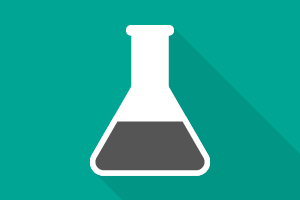Classroom Resources: Quantitative Chemistry
Filter by:
101 – 125 of 135 Classroom Resources
-

Mole Concept, Significant Figures, Dimensional Analysis, Measurements, Scientific Notation, Molar Mass, Molecular Formula | High School
Activity: Can You Color A Mole? Mark as Favorite (95 Favorites)
In this activity, students determine how many moles of paraffin are used when they color a piece of paper as well as how many molecules and moles of wax are in one crayon.
-

Stoichiometry, Dimensional Analysis, Mole Concept, Gas Laws, Ideal Gas, Molarity, Concentration, Electrolysis, Electrons | High School
Lesson Plan: Stoichiometry Set-up Method Mark as Favorite (71 Favorites)
In this lesson, students will learn how to follow a process of visual cues in combination with a step-by-step problem solving method for different types of stoichiometric problems. This method can be particularly beneficial for students who struggle with completing multi-step calculations.
-

Stoichiometry, Mole Concept, Dimensional Analysis | High School
Lesson Plan: Map It Out! Mark as Favorite (62 Favorites)
In this lesson, students should be able to use a graphic organizer to help them solve stoichiometry problems. This lesson utilizes the Cornell note format.
-

Mole Concept, Dimensional Analysis, Measurements | High School
Activity: Bring Me A Mole Mark as Favorite (85 Favorites)
In this lab, students take an abstract concept, the mole, and turn it into a real measurable concept.
-

Measurements, Accuracy, SI Units, Significant Figures | Middle School, High School
Activity: Simulation Activity: Measuring Volume Mark as Favorite (61 Favorites)
In this simulation, students will participate in a 10 question quiz. The quiz questions are each made of two parts, with the first part requiring the student to analyze an image of a graduated cylinder in order to report an accurate measurement. Students must use the correct number of digits based on the markings presented on the cylinder when reporting the measurement. In the second portion of the question the students will determine the uncertainty value of the graduated cylinder, again by analyzing its markings. The simulation is made up of several different sizes of graduated cylinders, each containing unique markings, so students will be challenged to analyze each individually.
-

Percent Composition, Measurements | High School
Lab: Percent Composition Mark as Favorite (20 Favorites)
In this lab, students will calculate the percent composition of sugar in gum and the percent composition of water in popcorn kernels.
-

Solute & Solvent, Molarity, Tyndall Effect, Concentration, Stoichiometry, Dimensional Analysis, Mole Concept | High School
Activity: Solubility & Solutions Mark as Favorite (22 Favorites)
In this inquiry activity, students investigate types of solutions, identifying the solute and solvent, and classifying each solution. They them solve stoichiometry problems involving solutions of different concentrations.
-

Gas Laws, Matter, Density, Density, Temperature, Pressure, Volume, Graphing, Observations, Measurements | High School, Middle School
Lab: Pressure Bottle Mark as Favorite (4 Favorites)
In this lab, students determine the relationship between volume and pressure of a gas and its temperature and address the common misconception that air does not have mass or density.
-

Conservation of Mass, Measurements, Conservation of Mass, Chemical Change, Observations, Physical Change, Chemical Change | High School, Middle School
Lab: Mass & Change Mark as Favorite (18 Favorites)
In this lab, students will use unified particle pictures of solid, liquid, and gas to explain the law of conservation of mass after carrying out various experiments.
-

Measurements, Percent Composition | High School
Lab: Mineral Investigation Mark as Favorite (22 Favorites)
In this lab, students will put their problem solving skills to work as a team to determine how many specific samples of ore can be made from a lode equivalent to the size of their classroom. This lab is perfect for the start of the school year to engage students in real-life applications of chemistry, as well as essential mathematic and measurement skills.
-

Density, Observations, Inferences, Measurements, Identifying an Unknown, Error Analysis, Scientific Method | High School
Lab: Colors of the Rainbow Mark as Favorite (39 Favorites)
In this lab, students will practice density calculations and put their calculations to test by creating their own density column.
-

Density, Dimensional Analysis, Review, Measurements, Accuracy, Accuracy, Experimental Design, Error Analysis | High School, Middle School
Lab: Bowling Ball—Will it Sink or Float in Water? Mark as Favorite (7 Favorites)
In this lab, students will find the density of a bowling ball to determine whether it will sink or float in water.
-

Significant Figures, Measurements, Accuracy, Density, Accuracy, Error Analysis, Error Analysis | Middle School, High School
Lab: Significant Figures and Lab Data Mark as Favorite (101 Favorites)
In this lesson, students will use laboratory equipment of different precision to collect data for several different metals, and then use the data to calculate the density of each. They will then compare their calculated densities to accepted values and determine the combination of equipment that leads to the most accurate calculation of density.
-

Density, Measurements, Graphing, Experimental Design, Scientific Method, Physical Properties, Error Analysis, Significant Figures, Error Analysis | High School
Lab: Investigating the Density of an Irregular Solid Object Mark as Favorite (38 Favorites)
In this lab, students will use common laboratory equipment to devise a method to measure the density of several irregular objects. They will then create a formal laboratory report using both their own data and data from the entire class.
-

Mole Concept, Measurements, Dimensional Analysis, Molar Mass | High School
Lab: Calculating Moles Mark as Favorite (76 Favorites)
In this lab, students will have the opportunity to practice conducting the chemist’s way of counting atoms and molecules by using the mole. They will determine the mass of various common elements and compounds and convert this data into values of moles, atoms and molecules. This will allow students to realize the connection between commonly used laboratory chemicals and the quantitative data and calculations that are such a fundamental part of chemistry.
-

Mole Concept, Dimensional Analysis, Density | High School
Lab: Moles of Food Mark as Favorite (65 Favorites)
In this lab, students will analyze the nutrition label of a variety of foods to find the amount of specific elements in each serving. Students are asked to evaluate and compare the data in a series of questions, in order to convert the values to moles. This lab gives students the opportunity to see the connection between the chemistry mole concept and everyday foods.
-

Limiting Reactant, Classification of Reactions, Stoichiometry, Balancing Equations, Error Analysis | High School
Lab: Mole Relationships in a Single Displacement Reaction Mark as Favorite (28 Favorites)
In this lab, students will carry out a reaction between metallic copper and an aqueous solution of silver nitrate to determine the mole ratio between the reactants and the products and write a balanced equation based on the data.
-

Molarity, Concentration, Mixtures, Solute & Solvent, Dimensional Analysis, Mole Concept, Measurements | High School
Lab: Molarity of a Solution Mark as Favorite (44 Favorites)
In this lab, students calculate concentrations of and perform dilutions of Kool-Aid and juice solutions.
-

Percent Composition, Percent Composition, Mole Concept, Dimensional Analysis | High School
Lab: Percent Composition of Bubble Gum Mark as Favorite (66 Favorites)
In this lab, students will be introduced to the concept of percent composition. Students will determine the amount of sweetener in various brands of gum by determining the mass difference of the gum before and after it is chewed.
-

Molecular Formula, Stoichiometry, Law of Definite Proportions, Dimensional Analysis, Mole Concept, Classification of Reactions | High School
Lab: Finding the Formula of Magnesium Oxide Mark as Favorite (25 Favorites)
In this lab, students will recognize that oxygen has mass and that heating can involve and increase in mass as an element reacts to become an oxide
-

Measurements, SI Units, Accuracy, Introduction | High School
Activity: Mysteriously Melodramatic & Maniacal Metric Measurements Mark as Favorite (54 Favorites)
In this activity, students predict the measurements of objects using metric units. They then take the actual measurements and compare them to their predictions.
-

Stoichiometry, Percent Yield, Classification of Reactions, Balancing Equations, Chemical Change, Dimensional Analysis, Error Analysis, Measurements, Accuracy | High School
Lab: Baking Soda Stoichiometry Mark as Favorite (61 Favorites)
In this lab, students will decompose baking soda and use stoichiometry to determine the proper balanced chemical equation of its decomposition.
-

Density, Pressure, Temperature, Volume, Density, Error Analysis, Error Analysis, Measurements | High School
Lab: Gas Density and Relative Molecular Mass Mark as Favorite (3 Favorites)
In this lab, students will quantitatively determine the densities of four gases.
-

Limiting Reactant, Percent Yield, Stoichiometry, Balancing Equations, Chemical Change, Error Analysis, Dimensional Analysis, Acid Base Reactions, pH | High School
Lab: Limiting Reactant in a Balloon Mark as Favorite (59 Favorites)
In this lab, students perform a reaction between acetic acid and sodium bicarbonate and determine the amount of product formed and the limiting reactant.
-

Limiting Reactant, Stoichiometry, Dimensional Analysis, Mole Concept, Scientific Method | High School
Lab: Limiting Reactants in Brownies Mark as Favorite (25 Favorites)
In this lesson, students will investigate the idea of limiting reactant using a brownie recipe.